新概念英语一113课讲义
- 格式:docx
- 大小:13.98 KB
- 文档页数:4
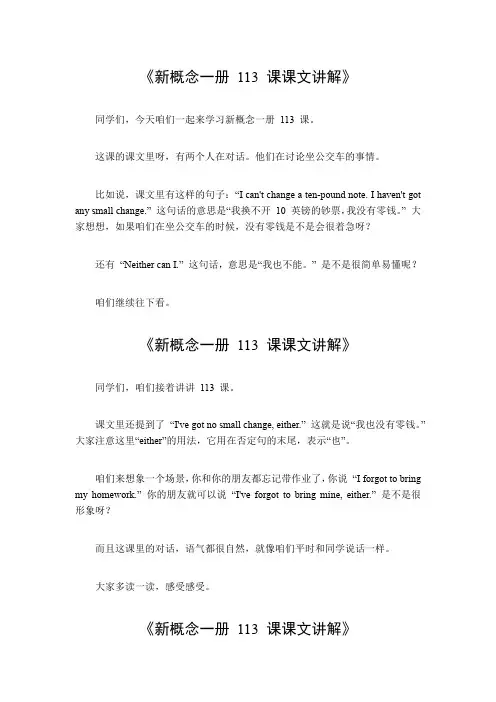
《新概念一册113 课课文讲解》同学们,今天咱们一起来学习新概念一册113 课。
这课的课文里呀,有两个人在对话。
他们在讨论坐公交车的事情。
比如说,课文里有这样的句子:“I can't change a ten-pound note. I haven't got any small change.” 这句话的意思是“我换不开10 英镑的钞票,我没有零钱。
” 大家想想,如果咱们在坐公交车的时候,没有零钱是不是会很着急呀?还有“Neither can I.” 这句话,意思是“我也不能。
” 是不是很简单易懂呢?咱们继续往下看。
《新概念一册113 课课文讲解》同学们,咱们接着讲讲113 课。
课文里还提到了“I've got no small change, either.” 这就是说“我也没有零钱。
” 大家注意这里“either”的用法,它用在否定句的末尾,表示“也”。
咱们来想象一个场景,你和你的朋友都忘记带作业了,你说“I forgot to bring my homework.” 你的朋友就可以说“I've forgot to bring mine, either.” 是不是很形象呀?而且这课里的对话,语气都很自然,就像咱们平时和同学说话一样。
大家多读一读,感受感受。
《新概念一册113 课课文讲解》同学们,咱们再来说说113 课。
课文里的人物因为没有零钱,可能会有点小烦恼。
那咱们在生活中也要注意准备好零钱哦。
比如说,有一次小明坐公交车,发现自己没有零钱,幸好旁边的好心阿姨帮他换了,才顺利上了车。
这课的课文虽然不长,但是很实用。
大家要多读多练,把里面的句子都记住,以后遇到类似的情况就能轻松应对啦。
同学们,加油!相信你们能学好这一课。
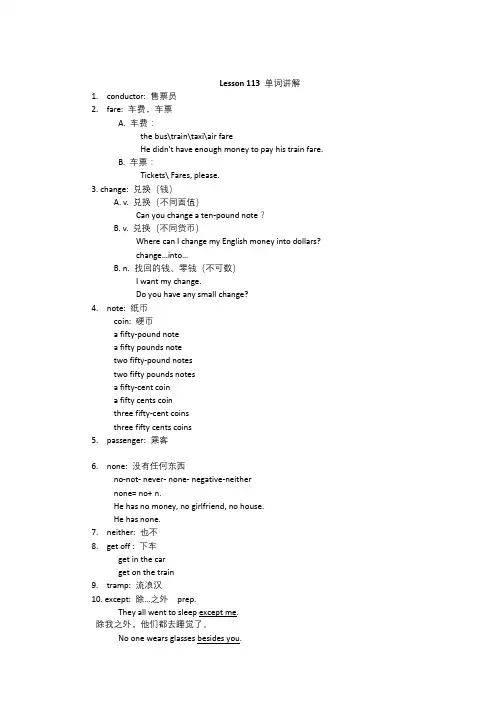
Lesson 113 单词讲解1. conductor: 售票员2. fare: 车费,车票A. 车费:the bus\train\taxi\air fareHe didn't have enough money to pay his train fare.B. 车票:Tickets\ Fares, please.3. change: 兑换(钱)A. v. 兑换(不同面值)Can you change a ten-pound note?B. v. 兑换(不同货币)Where can I change my English money into dollars?change…into…B. n. 找回的钱、零钱(不可数)I want my change.Do you have any small change?4. note: 纸币coin: 硬币a fifty-pound notea fifty pounds notetwo fifty-pound notestwo fifty pounds notesa fifty-cent coina fifty cents cointhree fifty-cent coinsthree fifty cents coins5. passenger: 乘客6. none: 没有任何东西no-not- never- none- negative-neithernone= no+ n.He has no money, no girlfriend, no house.He has none.7. neither: 也不8. get off : 下车get in the carget on the train9. tramp: 流浪汉10. except: 除…之外prep.They all went to sleep except me.除我之外,他们都去睡觉了。
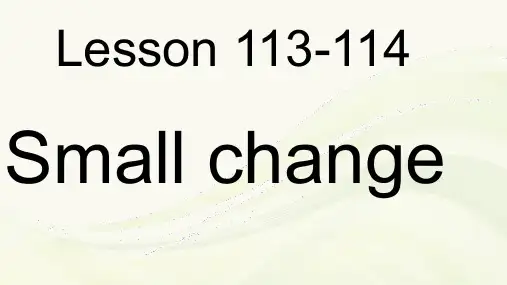
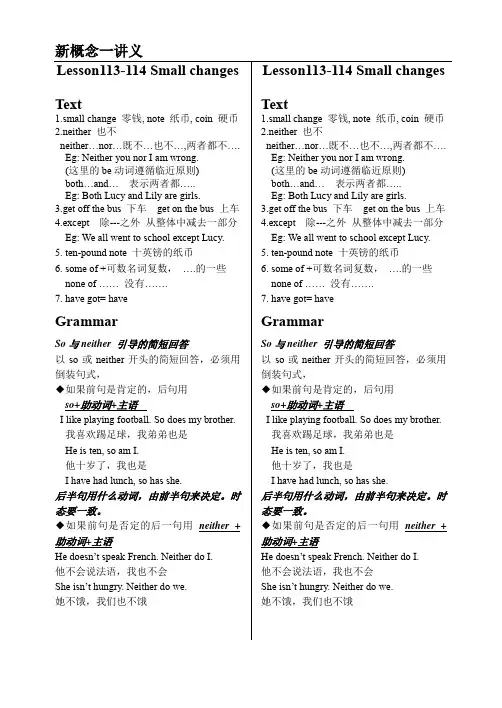
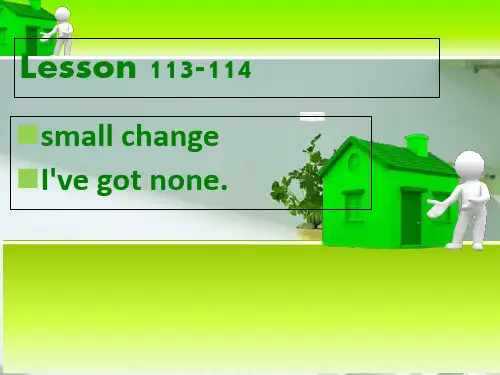
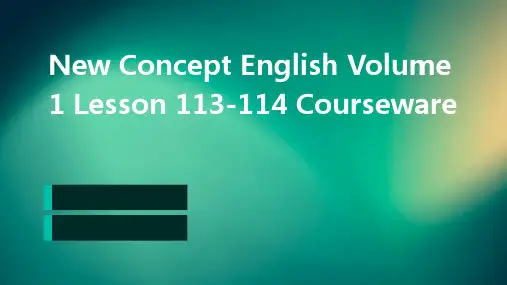
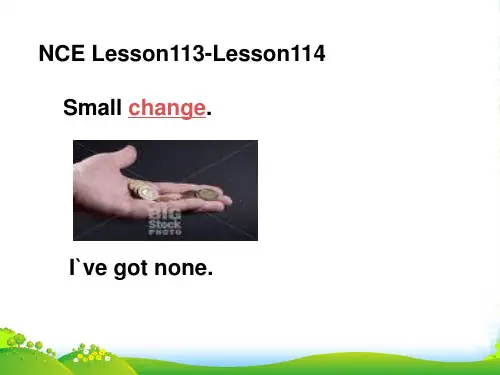
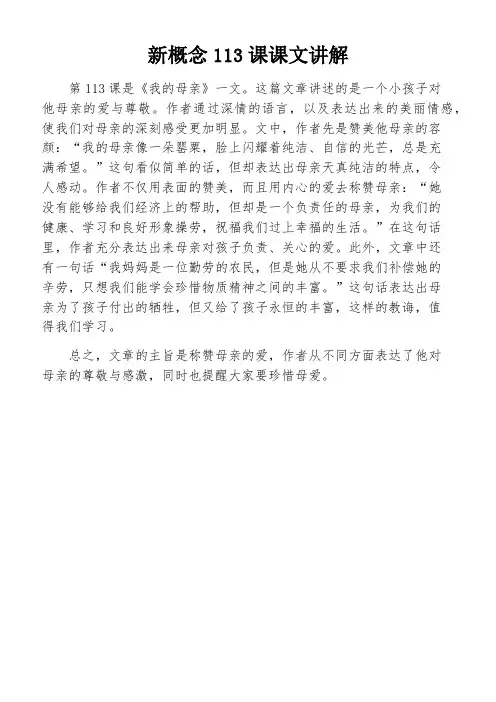
新概念113课课文讲解
第113课是《我的母亲》一文。
这篇文章讲述的是一个小孩子对
他母亲的爱与尊敬。
作者通过深情的语言,以及表达出来的美丽情感,使我们对母亲的深刻感受更加明显。
文中,作者先是赞美他母亲的容颜:“我的母亲像一朵罂粟,脸上闪耀着纯洁、自信的光芒,总是充
满希望。
”这句看似简单的话,但却表达出母亲天真纯洁的特点,令
人感动。
作者不仅用表面的赞美,而且用内心的爱去称赞母亲:“她
没有能够给我们经济上的帮助,但却是一个负责任的母亲,为我们的
健康、学习和良好形象操劳,祝福我们过上幸福的生活。
”在这句话里,作者充分表达出来母亲对孩子负责、关心的爱。
此外,文章中还
有一句话“我妈妈是一位勤劳的农民,但是她从不要求我们补偿她的
辛劳,只想我们能学会珍惜物质精神之间的丰富。
”这句话表达出母
亲为了孩子付出的牺牲,但又给了孩子永恒的丰富,这样的教诲,值
得我们学习。
总之,文章的主旨是称赞母亲的爱,作者从不同方面表达了他对
母亲的尊敬与感激,同时也提醒大家要珍惜母爱。
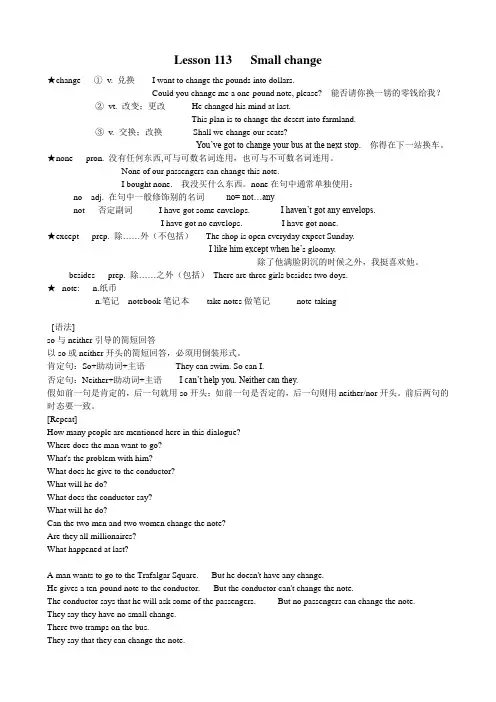
Lesson 113 Small change★change ①v. 兑换I want to change the pounds into dollars.Could you change me a one-pound note, please? 能否请你换一镑的零钱给我?②vt. 改变;更改He changed his mind at last.This plan is to change the desert into farmland.③v. 交换;改换Shall we change our seats?You’ve got to change your bus at the next stop. 你得在下一站换车。
★none pron. 没有任何东西,可与可数名词连用,也可与不可数名词连用。
None of our passengers can change this note.I bought none. 我没买什么东西。
none在句中通常单独使用:no adj. 在句中一般修饰别的名词no= not…anynot 否定副词I have got some envelops. I haven’t got any envelops.I have got no envelops. I have got none.★except prep. 除……外(不包括)The shop is open everyday expect Sunday.I like him except when he’s gloomy.除了他满脸阴沉的时候之外,我挺喜欢他。
besides prep. 除……之外(包括)There are three girls besides two doys.★note: n.纸币n.笔记notebook 笔记本take notes 做笔记note-taking[语法]so与neither引导的简短回答以so或neither开头的简短回答,必须用倒装形式。
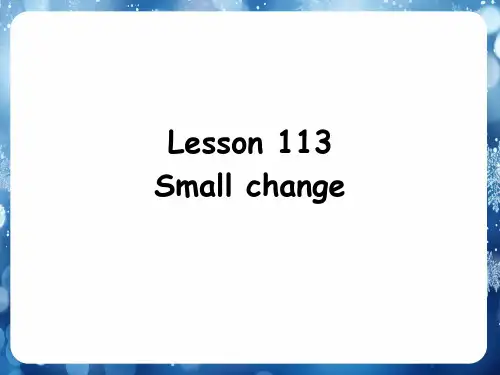
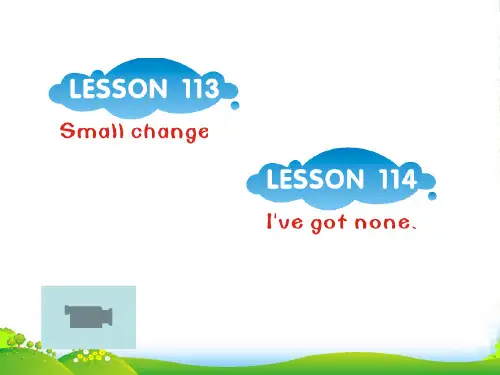
Lesson 113 Small change 零钱(línɡ qián)Lesson 114 I've got none. 我没有(méi yǒu)New words and expressions生词(shēngcí)和短语conductor n.售票员fare n.车费(chē fèi),车票change v.兑换(duìhuàn)(钱)note n.纸币passenger n.乘客none pron.没有任何东西neither adv.也不get off 下车tramp n.流浪汉except prep.除……外【课文内容】CONDUCTOR:Fares, please!MAN:Trafalgar Square please.CONDUCTOR:I'm sorry, sir. I can't change a ten-pound note. Haven't you got any small change?MAN:I've got no small change, I'm afraid.CONDUCTOR:I'll ask some of the passengers.CONDUCTOR:Have you any small change, sir?1st PASSENGER:I'm sorry. I've got none.2nd PASSENGER:I haven't got any eitherCONDUCTOR:Can you change this ten-pound note, madam? 3rd PASSENGER:I'm afraid I can't.4th PASSENGER:Neither can I.CONDUCTOR:I'm very sorry, sir. You must get off the bus. None of our passengers can change this note. They're all millionaires!TWO TRAMPS:Except us.1st TRAMP:I've got some small change.2nd TRAMP: So have I.【单词(dāncí)讲解】conductor n. 售票员He asked the conductor for a ticket.他向售票员买了一张票。
Lesson 113 Small change 讲义重点
一、本课重要单词
conductor: n.售票员;
fare: 车费,交通工具的票价; a taxi fare 出租车费; a single fare 单程票价;
change: v.兑换(钱),换零(钱)例:
Can I change pounds into dollars here?
这里可以把英镑兑换成美元吗?
n. 零钱,找零:
You may keep the change. 你可以留下零钱,不用找了。
note: n.纸币;
a five-pound note 5英镑纸币; Pay in notes.用钞票付款。
passenger : n. 乘客,旅客;
none: pron. 三者或三者以上的人或事物中任何一个都不….例:None of the students could answer the question.
没有一个学生会回答那个问题。
None of us has ever been abroad.
我们所有的人都没有出过国,
neither : adv. 两者都不…(置于单数名词之前)
Neither book is bought in Beijing.
这两本书都不是在北京买的。
Neither is right. 两者都不正确。
get off:下车;
tramp: n. 流浪汉,漂泊者’
except : prep. 除…之外;
二、本课重要知识点:
1. Have you any small change? 您有零钱吗?
在本句中关于have变疑问句的用法需要引起注意:
(1)have用作实意动词表示状态,如表示拥有、患病或用于have to 表示“必须”等,在变疑问句时可以直接将have提前,也可根据情况在句首使用do,does,did,例:
I have some small change. 我有一些零钱,变疑问句:
常用句式:Do you have any small change?您有零钱吗?
不常见句式:Have you any small change? 您有零钱吗?
(2)用作实意动词表示动作,如表示“吃(=eat)”、“喝(=drink)”、“度过(=spend)”等,构成疑问式时不能将have提前至句首,而应在句首使用do,does,did,例:
He has breakfast at home. 变为疑问句:
正确句式:
Does he have breakfast at home?他在家吃早餐吗?
错误句式:
Has he breakfast at home?
2. Neither can I. 我也不能。
在本句中我们要掌握neither与so关于简略回答的用法:
当有人说了一句肯定意义上的话,其肯定的内容也适于你或另外的人或物时,要用so作答,当有人说了一句否定意义上的话,其否定的内容也适于你或另外的人或物时,要用neither作答。
具体用法如下:
(1)以so或neither开头的简短回答,必须用倒装句式。
例:I’m tired. So am I。
我累了,我也是。
She isn’t hungry. Neither am I.她不饿,我也是。
I won’t go to Paris. Neither will she.我不会去巴黎,她也不会。
(2)如果前句是肯定的,后面用“so+助动词+主语”的结构,如果前句是否定的,后一句用“neither+助动词+主语”的结构,例:
I like English. So does he. 我喜欢英语,他也是。
I am a student. So is she. 我是个学生,她也是。
I don’t like English. Neither does he. 我不喜欢英语,他也是。
I am not a student. Neither is she.我不是个学生,她也不是。
3. They are all millionaires. Except us . 他们是百万富翁,除了我们。
在本句中我们要掌握except与except for的用法:
(1)except强调“除去,不包括”,强调所排除的不包括在内,一般是同类之间的关系。
例:
I like nothing except English.
除了英语我什么都不喜欢。
I like everything except English.
除了英语我什么都喜欢。
(2)except for 强调对整体进行细节上的补充,它包括后面所排除的内容。
例:
They are good students except for him.
除了他之外,他们都是好学生。
(包括“他”)
They are good students except for him.
除了他之外,他们都是好学生。
(不包括“他”)
I could answer all the questions except for the last one.
除了最后一题外,所有的题我都可以作答。
(包括最后一题)I could answer all the questions except the last one.
除了最后一题外,所有的题我都可以作答。
(不包括最后一题)。